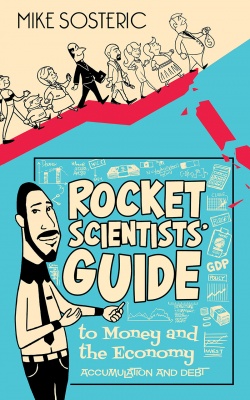Rocket Scientists' Guide to Money and the Economy: Difference between revisions
An Avatar.Global Resource
No edit summary |
No edit summary |
||
| Line 96: | Line 96: | ||
[[category:terms]] | [[category:terms]] | ||
[[category:lightningpath]] | [[category:lightningpath]] | ||
[[Is a related LP term::Accumulating Class| ]] | |||
[[Is a related LP term::Money| ]] | |||
[[Is a related LP term::Regime of Accumulation| ]] | [[Is a related LP term::Regime of Accumulation| ]] | ||
[[Is a related LP term::Unfettered Accumulation| ]] | |||
[[Is a related LP term::Accumulation| ]] | |||
[[Is a related LP term::Accumulating Class| ]] | [[Is a related LP term::Accumulating Class| ]] | ||
[[Is a::Rocket Guide| ]] | [[Is a::Rocket Guide| ]] | ||
Latest revision as of 13:40, 17 October 2024
Rocket Scientists' Guide to Money and the Economy
The Rocket Scientists' Guide to Money and the Economy (RSGME) offers a comprehensive introduction to the nature of money, viewing it as abstracted labor time, and explores its role within economic systems. The guide delves into the addictive nature of money, the dynamics of the Accumulating Class, and the societal consequences of accumulation. It critiques the way modern economies prioritize profit and accumulation over equitable labor exchange, leading to social and environmental crises. By combining theoretical insights with practical examples, the book advocates for systemic reforms to promote economic fairness and social well-being.

LP Rocket Guides
Rocket Guides > Rocket Scientists' Guide to Authentic Spirituality, Rocket Scientists' Guide to Money and the Economy
Related LP Terms
RSGME >
Non-LP Related Terms
Rocket Scientists' Guide to Money and the Economy - Key Concepts and Sections
Preface
- Introduction to the purpose and scope of the Rocket Guides
- Emphasis on accessibility and paradigmatic change
Introduction
- The central role of money in the modern world
- Challenges the notion that money is inherently evil
- Importance of understanding the true nature of money
The Nature of Money
- Money as abstracted labor time
- Money facilitates economic exchange by representing labor
- Definition: Money = Labor Time
The Economy
- Economy as a system of labor exchange
- Different types of economies: monetized, underground, and informal
- The social nature of economic exchange
The Source of Money
- Money creation through agreement and production
- Money as a container for labor value
The Value of Money
- Determining the value of money through labor time
- Concordance: collective agreement on the value of money
- The role of money supply in representing total labor in the economy
The Problem with Money
- Minor issues: determining costs and motivating labor
- Major issues: money addiction and accumulation
Money Addiction
- Money as a powerful addictive substance
- Dopamine release and attachment leading to money addiction
- Behavioral characteristics of money addicts
Accumulation
- Accumulation of labor-power by the Accumulating Class
- Distortion of economies and inversion of economic purpose
- Long-term societal and environmental consequences
The Baker's Story
- Illustrative tale of accumulation and its impacts
- Ethical dilemmas and social inequality arising from overcharging
Power and Accumulation
- Accumulated money as a means to command labor
- The corrupting influence of power gained through accumulation
Profit and the Business of Accumulation
- Profit as euphemism for labor accumulation
- Shifts in economic goals from social exchange to profit maximization
Crisis and Solutions
- Current global crises linked to money and accumulation
- Proposals for addressing economic and social imbalances
Conclusion
- Urgent need for systemic reform
- Encouragement to understand and address the true nature of money and accumulation
References
- Comprehensive list of sources and additional reading materials
Related LP Content and Courses
Citation and Legal
The SpiritWiki is a freely available, open-access Knowledge System devoted to health, healing, and reconnection. You may freely use information in the SpiritWiki; citation and attribution are welcomed, but not required. You can help this knowledge system grow by joining its Patreon.
The SpiritWiki is marked CC0 1.0 Universal and in the public domain, free for everyone on the planet to use. Please support its growth.
Footnotes
